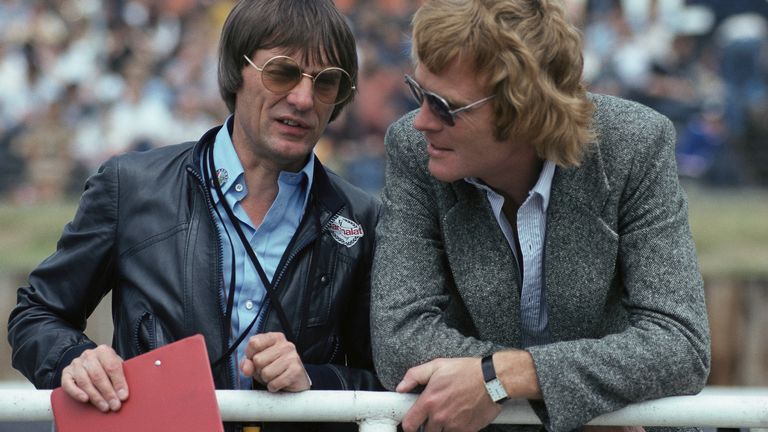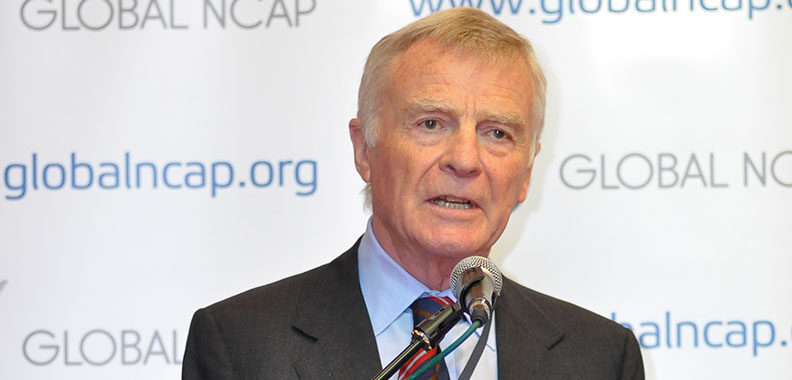Max Mosley, former president of the FIA, racer and driving force behind Euro NCAP, has passed away aged 81.
Born in 1940, Mosley attended schools in Britain, France and Germany and went on to study at Oxford University, where he read physics and was elected Secretary of the Oxford Union debating society. He later trained as a lawyer and became a barrister specializing in patent and trademark law.
However, Mosley also spent much of his youth racing cars, first in sportscars and then later in Formula 2 driving Brabham and Lotus machines, including a one-off entry in a non-championship Formula 1 race. He retired from driving in 1969 to co-found March Engineering, alongside Alan Rees, Graham Coaker and Robin Herd. The company quickly established itself as a leading manufacturer, placing third in the Formula 1 constructors’ championship in 1970. Mosley dealt with legal and commercial matters for the company between 1969 and 1977.
In the mid-1970s, he became the official legal advisor to the Formula One Constructors’ Association (FOCA), the body that represented Formula 1 constructors and ended up at loggerheads with the sport’s then governing body, FISA (Fédération Internationale du Sport Automobile). In this role, Mosley drew up the first Concorde Agreement, which was instrumental in settling the long-standing dispute between FOCA and FISA. He was elected president of the Manufacturers’ Commission of FISA in 1986 and represented the world’s motor industry on the World Motor Sport Council. In 1991 he was elected president of FISA, which morphed into the FIA (Fédération Internationale de l’Automobile).
As president, Mosley was determined that the FIA should make a difference in the world outside motor racing and set about promoting increased road safety and the use of green technology. To this end, in his first year in office he set up the FIA Brussels office, giving motorsport and the FIA’s member motoring organizations in the European Union an effective voice in Brussels for the first time. In the same year, he was elected honorary president of the European Parliament Automobile Users’ Intergroup and formed the Expert Advisory Safety Committee, which brought together leading safety experts in motorsport to research and find solutions for major safety issues in motorsport.
Speaking in 2017, on the 25th anniversary of the establishment of the independent safety testing organization Euro NCAP, Mosley explained, “What really started my interest in safety was the racing cars being obviously really dangerous – and the governing body in those days having a completely different view. Their attitude was ‘If you want to do it, take the risk’. That seemed completely irrational so later on, when I found myself in a position to do something about safety for road and racing cars, initially through FISA and then Euro NCAP, that’s what I did.”
 Safety in motorsport came to the fore in 1994 with the death of Ayrton Senna at the San Marino GP. In the wake of the Brazilian driver’s death, Mosley instituted widespread reform of safety in the sport. The measures he was instrumental in forcing through can be credited with the level of safety enjoyed by drivers in all disciplines to this day.
Safety in motorsport came to the fore in 1994 with the death of Ayrton Senna at the San Marino GP. In the wake of the Brazilian driver’s death, Mosley instituted widespread reform of safety in the sport. The measures he was instrumental in forcing through can be credited with the level of safety enjoyed by drivers in all disciplines to this day.
However, Mosley’s longest-standing legacy is in the area of automotive crash testing. In 1996 he led the FIA’s successful campaign to modernize and strengthen EU crash test standards for the first time since 1974, achieved by proposing to the European Parliament amendments requiring the offset frontal test and 300mm clearance side-impact test.
He was also instrumental in the establishment of Euro NCAP, which has been described by the European Commission as the most cost-effective road safety initiative of the last 20 years. Mosley remained chairman from 1996 until 2004 and he recalled that manufacturers were, on the whole, opposed to such tests, seeing them as a route to increased cost that would not improve sales. However, Louis Schweitzer, then head of Renault, recognized that there was a benefit to be had.
“Schweitzer realized that the old-fashioned ‘safety doesn’t sell’ attitude didn’t really apply. I’m sure he had a moral view too. So he decided to take the risk, get behind NCAP’s new crash tests – and Renault became the very first company to get a five-star rating for occupant protection for its Laguna, in 2001. It was remarkable,” recalled Mosley. The result was that Renault’s reputation for safety overtook that of traditionally ‘safe’ brands such as Volvo and Mercedes. “Mercedes took the attitude that they knew what they were doing and did not need us to help. But we crash-tested their then C-class and it was awarded only two stars. That got them going.”
Mosley remained active with NCAP until the end of the last decade, and also formed and served as the first chairman of the Formula One Safety Commission, which focused on the development of Formula 1 circuit safety, He launched Formula Zero, a strategy for reducing fatalities and injuries on track and road, aimed at identifying the safety synergies between motorsport and motoring, and outlined an approach to road safety involving a zero-tolerance approach to deaths or injuries.
In 2002 he proposed the establishment of the FIA Foundation and the FIA Academy, serving as a trustee of the Foundation, a charity focused on promoting road safety, environmental protection and motorsport safety worldwide. The FIA Academy was created to develop projects to stimulate research and create the necessary framework to promote road safety and protect the environment.
In 2004 Mosley also proposed the establishment of the FIA Institute for Motor Sport Safety to develop and improve safety measures and sustainability across all areas of motorsport, from junior racing to top-level championships. He was re-elected as FIA president three times – in 1997, 2001 and 2005 – each time unopposed. He eventually stood down in 2009.


